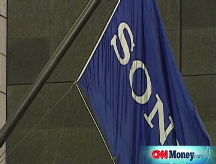Dollar surges vs. euro, tumbles vs. yen
Pound posts biggest drop versus the dollar since '71, euro sharply lower. Yen hits 13-year high.
NEW YORK (CNNMoney.com) -- Recession fears and expectations of sharp interest rate cuts by central banks in Europe sent the dollar soaring against the euro and the pound Friday, but the U.S. currency tumbled against the yen.
The euro fell 1.2% to $1.269 early in the session, but had dropped as much as 3% versus the dollar after the United Kingdom reported the first decline in economic production since 1992.
The British pound also tumbled, collapsing nearly 7% versus the dollar to $1.52, marking the biggest intraday decline since exchange rates became freely floated in 1971. But the pound had recovered by late morning in New York to trade down 1.1% at $1.7583.
Rate cuts on horizon? The British government reported that nation's gross domestic product, the broad measure of economic activity, fell 0.5% in the third quarter, and British treasury chief Alistair Darling vowed to do what was necessary to support the economy there.
Traders are expecting that the Bank of England and European Central Bank will have to make sharp interest rate cuts in the weeks and months ahead, much steeper than the cuts still available to policymakers with central banks in Japan and the United States.
The key benchmark interest rate of the Bank of Japan is 0.5%, and the U.S. Federal Reserve has already cut its fed funds rate to 1.5%. Meanwhile, the ECB's benchmark rate stands at 3.75%, while the Bank of England's rate is 4.5%.
Yen boost: The best performing major currency was the yen, which drove the dollar to a 13-year low of ¥91.10. By late morning in New York, the dollar was trading at ¥93.18.
The yen was driven higher by equity losses around the globe as investors lost confidence in the world economy. Investors often borrow yen to fund investments in higher-yielding currencies, such as the euro or the pound. When those currencies weaken, and investors reverse their positions, they are forced to buy back the yen, raising its value.
Investors also tend to buy into the yen as a defensive risk-aversion move.
Global stock markets were taking a beating Friday as spooked investors moved quickly to shift assets out of risky equities into perceived safe havens, like the dollar and yen.
"When the stocks are falling across the board and there is a big loss in risk appetite, the dollar rises. So does the the other low yielding currencies like the yen," said Ashraf Laidi, chief foreign exchange strategist for CMC Markets.
"There's nothing fundamental about any of this," said David Kelly, the chief market strategist for JPMorgan Funds. "What we're seeing is forced selling by some institutions. One of the ways of looking at what is going on is a mirror image of three to four months ago."
Laidi and Kelly both said those who bet against less expensive currencies like the dollar and the yen earlier this year, seeking higher returns in other currencies, are now forced to unwind those positions. ![]()




